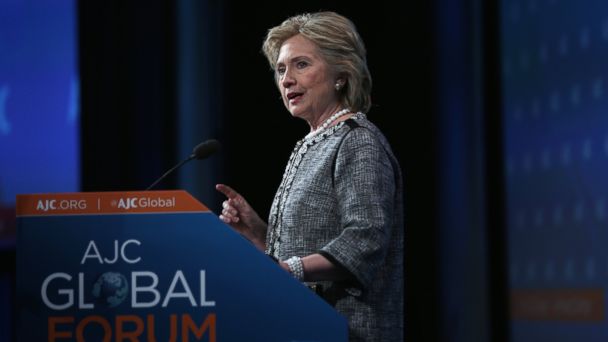Hillary Revising History of Her Iran Sanctions Role, Senator Claims

Former U.S. Secretary of State Hillary Clinton addresses the American Jewish Committee Global Forum on May 14, 2014 in Washington, DC. The AJC held the form to discuss topics related to the Jewish communities all around the world. Alex Wong/Getty Images
One Republican senator accused Hillary Clinton of exaggerating her role in imposing sanctions on Iran when she was Secretary of State, calling some of Clinton's recent comments on the topic a "blatant revision of history."
Sen. Mark Kirk, R-Ill., made the accusation a day after Clinton told the American Jewish Committee Wednesday night about her efforts to get U.N. sanctions on Iran in response to Iran's nuclear program.
"I worked for months to round-up the votes [in the UN Security Council]," Clinton said. "In the end we were successful… And then building on the framework established by the Security Council, with the help of Congress, the Obama administration imposed some of the most stringent, crippling sanctions on top of the international ones."
Those sanctions brought Iran to the negotiating table earlier this year.
"Secretary Clinton's comments are a blatant revision of history," said Kirk, who with Sen. Robert Menendez, D-N.J., co-sponsored several sanctions bills in recent years. "The fact is the Obama administration has opposed sanctions against Iran led by Senator Menendez and me every step of the way."
In 2012, the White House openly opposed Kirk and Menendez's efforts to add an amendment to the annual National Defense Authorization Act that would have blacklisted several of Iran's industrial sectors.
At the time, White House spokesman Tommy Vietor told Foreign Policy, "As we focus with our partners on effectively implementing these efforts, we believe additional authorities now threaten to undercut these efforts."
Menendez did not return ABC News' request for comment. Emails to Clinton's spokespeople were not immediately returned.
A spokesperson for Sen. Marco Rubio, R-Fla., a proponent of additional sanctions on Iran and a potential 2016 rival to Clinton if they both run for president, also noted the administration's opposition to previous sanctions legislation.
"The truth is that Hillary Clinton's State Department fought tooth and nail against the very Congressionally-imposed sanctions that she is now boasting about," Rubio spokesperson Alex Conant said in a statement.
Mark Dubowitz, executive director of the Foundation for the Defense of Democracies, noted that the primary objections to more sanctions came from the White House, not the State or Treasury departments tasked with implementing its policies. And, he added, Clinton's State Department does deserve credit for getting the United Nations Security Council on board with tough sanctions.
But she isn't giving Congress enough credit for its work, Dubowitz said.
"It significantly understates the pivotal role that Congress played in originating and passing some of the most effective energy and financial sanctions," he said of Clinton's comments.
Former congressman Howard Berman, a Democrat from California who co-sponsored the 2010 Comprehensive Iran Sanctions, Accountability and Divestment Act, praised Clinton's corralling of the U.N. Security Council, and applauded the administration's sanctions push as "a masterful performance" which brought Iran to the nuclear negotiating table.
Referring to Clinton's assessment of her role, Berman said, "There's some almost automatic human tendency in politics to think that one's role was the critical additional factor in making something happen."
Dubowitz said he hoped that over time, recognition for the Iran sanctions will also go to "unsung heroes" like Stuart Levy, the first Undersecretary for Terrorism and Financial Intelligence at the Treasury Department, as well as others in the State Department and on Capitol Hill.
"When the history of Iran sanctions is written, I hope it actually also gives credit to many of the people whose names we don't know or who are not as famous as Hillary Clinton," he said.